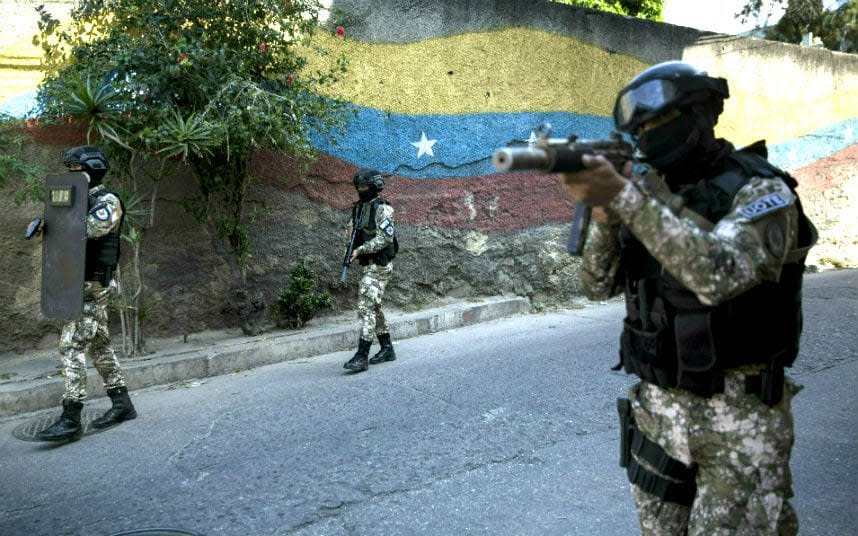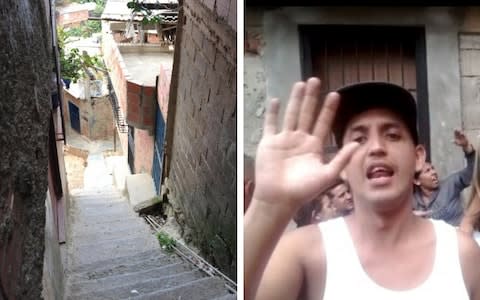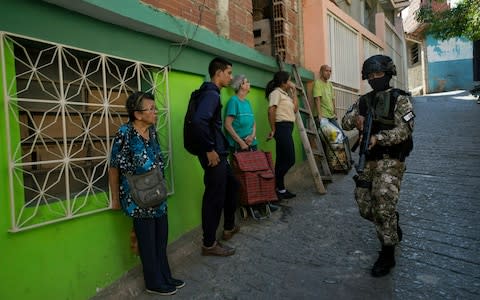'The people who killed him wore uniforms': Inside the secret police squads eliminating Maduro's enemies in Venezuela

The crack of the gunshot echoed down the narrow concrete stairs and off the crumbling hotchpotch block walls closing in over Jhonny Godoy as he slumped to his death.
Two days earlier the 29-year-old was running through his neighbourhood with a wide grin, draped in a Venezuelan flag.
"Maduro get out, you son of a bitch," he cried in the empty road outside his home in a defiant a video uploaded to social media.
Then the feared Special Action Forces (FAES) police unit came knocking. “The people who killed him were wearing uniforms and had ski masks,” a family member who didn’t want to be identified out of fear of more violence told The Telegraph.
They dragged him out of his home and onto the steep steps by his collar amid screams of protest from his mother, slammed the door shut and shot him dead. Family members and neighbors heard him begging for his life in the seconds before the gun was fired.
Mr Godoy is one of 40 to have lost his life in such circumstances since protests shook Venezuela this year, the UN estimate. More than 900 have been indiscriminately locked up in a crackdown on political dissent that has left an tense silence on the streets.
Residents of working class 'barrios' like Mr Godoy's that rose up are now watched over by FEAS operatives lurking in the shadows as the crisis in Venezuela hurtles towards another climax.
The regime is bracing itself for opposition groups to defy security forces and hand deliver US aid stacking up on the border in what would be a symbolic victory in the eyes of some of the most impoverished Venezuelans.
But the fear imposed by President Nicolas Maduro's special forces could prevent working class areas where the country's crisis has hit hardest from demanding aid be let in.
“We’re all going hungry here but in the end nobody will say anything, because we see what happens,” said another family member of Mr Godoy.
Neighbours in Mr Godoy's barrio say that on the day he was shot, dozens of agents from FAES swarmed the area.

On the day the family spoke to The Telegraph several weeks later, an SUV of officials with baseball caps marked as FAES and wearing ski masks appeared to be staging an operation at the neighborhood’s entrance.
President Maduro's authority is being challenged by Juan Guaido, who on January 23 declared himself the country’s legitimate president amid a nationwide uprising.
Increasingly isolated at home and abroad, Mr Maduro has relied heavily on the FAES, created in 2017 with a vague directive to fight crime and terrorism, to prevent working class communities from showing further support for Mr Guaido.
Agents from the group even arrived at the home of Juan Guaido on January 31 looking for his wife and daughters; the opposition leader later called it an attempt to intimidate.
Mr Godoy’s crime, his family says, was speaking out against the regime.
“This happened because of the video and because he went out to protest,” one of his relatives said. “They’re cracking down on places like this, where the government used to have support but now they don’t.”
The family says his death certificate only specifies he died of a gunshot wound and they haven’t received any information about an investigation into his death.

On the night that Mr Guaido declared himself interim president, protests and celebrations continued into the early morning. Government security forces moved in to snuff out the excitement across the country.
“We were out celebrating, because we’re tired of this government and people in this country are going hungry,” said Eddison Peña. The 22 year-old was with a group of friends in the coastal state of Vargas when he believes the state’s police force drove by and indiscriminately started shooting rubber bullets. One pierced his right eye and he lost his vision.
“They were sent to shut us up,” he said.
In the Caracas barrio of Catia similar groups were celebrating and protesting one night when a group believed to be the FAES drove by and opened fire. Alixon Pisani, 19, was shot and died in the gunfire.
“I think everybody here knows that nobody can support a government that’s not doing what it needs to do,” his aunt Nivea Troloro said. “And this is to intimidate us.”

As the power struggle continues, with the standoff now focused on several tons of humanitarian aid stockpiled on the border ahead of Saturday's planned grab, rights groups fear the regime’s brutality could escalate further in the barrios belonging to people like Mr Godoy.
“We’re seeing a heavy hand is being used to prevent protests from continuing,” said Fernando Pereira, the head of CECODAP, an NGO that monitors children’s rights in the country. “Arrests are being used to intimidate and threaten.”
Apart from demanding change and a solution to the crisis, the families affected by the crackdown now want justice as well.
“This is a rich country left in pieces,” said the family member of MrGodoy. “Then apart from that, they come and kill us.”

 Yahoo News
Yahoo News 